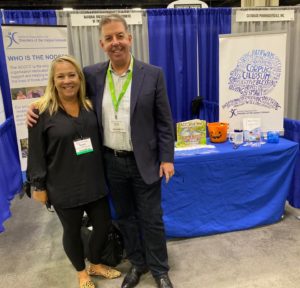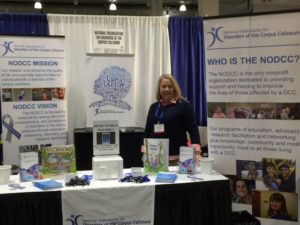When receiving a diagnosis of any condition, parents and patients want answers. In many cases and especially with a rare diagnosis, answers are not always possible or even known. That is certainly true of the conditions that fall under disorders of the corpus callosum (DCC): agenesis (ACC), partial agenesis (P-ACC), hypoplasia, and dysgenesis. There is a wide variation in the cognitive, social, and behavioral abilities of adults and children with a DCC. According to researchers, there is not an effective way to predict long-term outcomes for a child with a callosal disorder, and there is also no data on what interventions are most beneficial. While that may be disheartening to hear, it explains why many doctors cannot give parents more information.

Recognizing the need to be a resource to medical professionals, the NODCC conducted its first mailing to neurologists in 2005 sharing information on the organization and offering resource material. The NODCC began attending the Child Neurology Society annual conference in 2008 to have conversations with attendees and provide materials for the neurologists’ offices and clinics. In the last four years, we’ve been able to expand the Medical Outreach Program to attend more conferences including events for American Association of Neuroscience Nurses, American Epilepsy Society and Society for Maternal Fetal Medicine. We’ve also conducted mailings to neurology professionals surrounding local conferences and participated virtually in events.
NODCC Managing Director, Barb Fonseca, leads this program and attends the conferences on behalf of the organization. She said that there continues to be miseducation and lack of information, even in the medical community, and providing professionals information helps everyone make informed decisions. The feedback on the NODCC’s presence at these events has been positive with doctors and nurses sharing that they are excited the organization exists to refer patients for a community of support. Recently, one neurologist requested 50 education booklets to give to patients in his office.

The Medical Outreach program has grown thanks to the fundraising efforts annually through the Fall Fundraiser. The contributions have directly impacted the number of conferences we have been able to attend in recent years as well as the materials we can provide.
In addition to continuing to raise funds for this program, the NODCC is also focused on how we can impact research so scientists can learn more about the genetic cause of the conditions and factors that might predict a child’s development. The NODCC has initiated the process to create a Patient Registry to serve as a standardized platform to collect information on adults and children with callosal conditions. Our hope is by helping create a global database, we can encourage more research on the conditions that will eventually lead to better predictions about the challenges a child will face and the treatments and strategies that will help overcome these challenges.
To be part of the Medical Outreach Program and Patient Registry, we need your help meeting our fundraising goals this year. You can participate in our Fall Fundraiser in several ways and become part of the exciting programs that will continue to improve the lives of those living with disorders of the corpus callosum. For more information on how to get involved, visit our fundraising page: https://nodcc.org/get-involved/fundraising/

